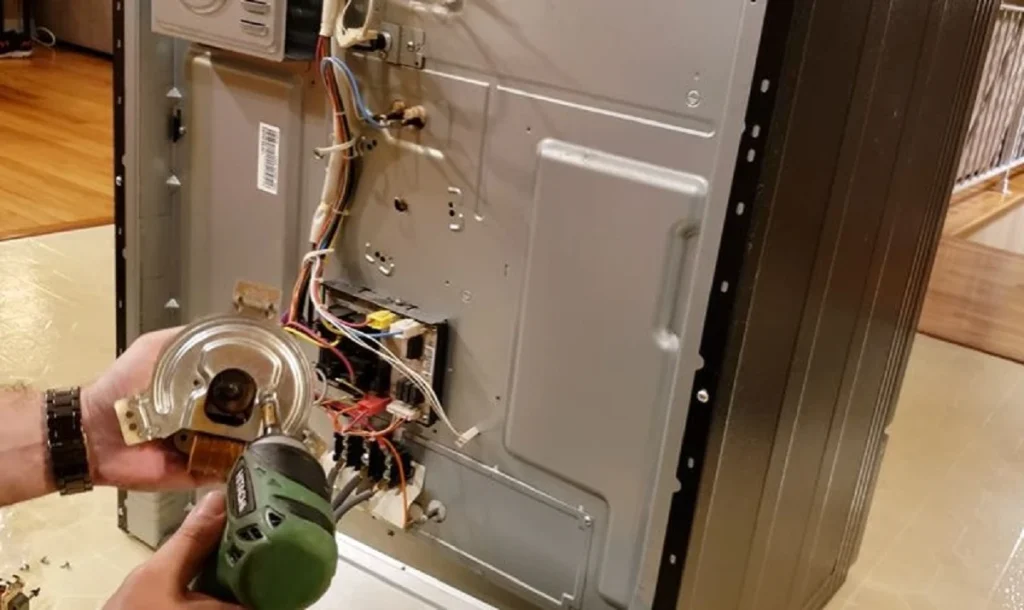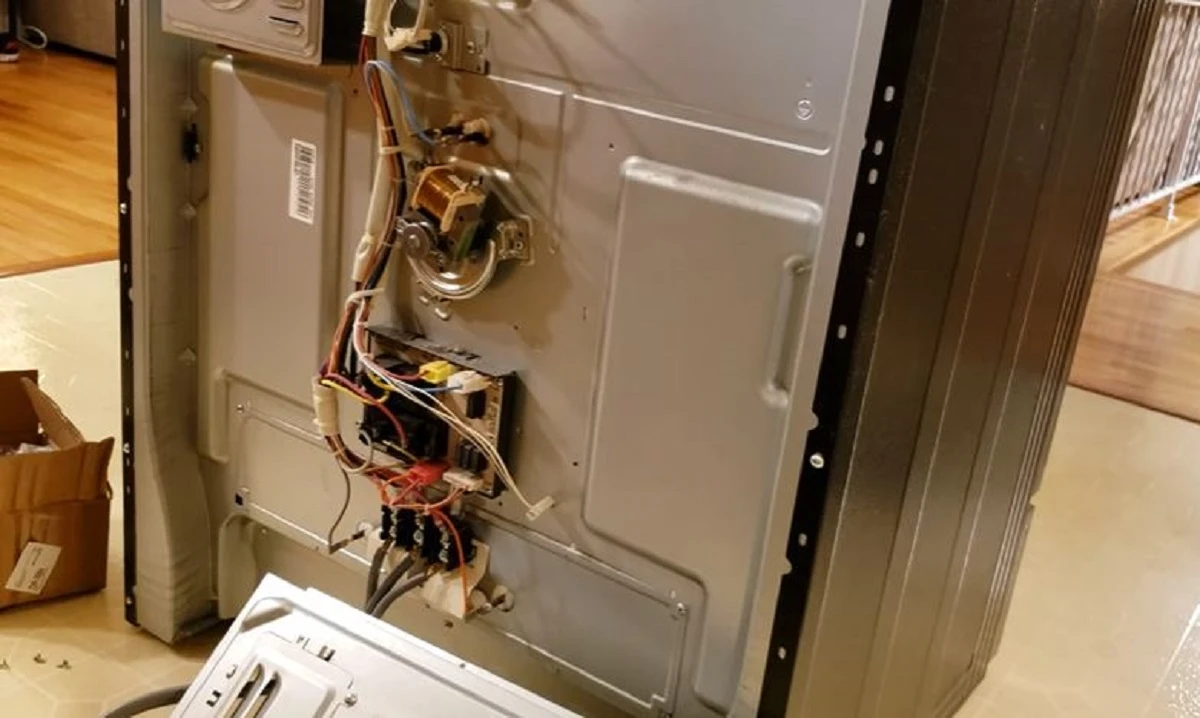6 Reasons Oven Making Noise and Their Solutions
The sound of an oven making unusual noises can evoke feelings of concern or curiosity. It’s natural to wonder if these sounds indicate a problem or are just a part of normal operation.
Ovens, whether electric or gas, can produce various noises during operation. A common noise, especially in modern ovens, is a buzzing or humming sound. This often occurs due to the cooling fan, which activates to distribute hot air throughout the appliance or to cool it down after use. This fan may run for a prolonged period, even after the oven is turned off, to prevent overheating.
Specific noises can indicate different issues. Clicking sounds, for instance, is usually heard when control relays cycle the bake and broil elements on and off to maintain temperature. This is considered a normal operation sound.
Abrupt booming sounds, particularly in gas ovens, might suggest dirty igniters. In contrast, rattling or grinding noises could point to loose parts, such as the fan or oven body. A weakening igniter in an older gas oven can also produce a booming sound upon turning it on.
A noisy oven fan is a common problem and can be due to simple reasons like a loose blade or a fixing nut. Gradually, the fan blade may become warped or damaged, leading to louder operation noises.
Grease buildup on the fan element can also cause excessive noise, as the fan works harder to function efficiently. In such cases, cleaning or repairing the fan can mitigate the noise.
If an oven begins making unusual noises, particularly loud grinding, screeching, or rattling, it’s advisable to seek professional assistance. Attempting DIY repairs without the proper tools or expertise can lead to further damage.
Read Also: 6 Common Causes of a Gas Oven Won’t Turn Off
Is a Noisy Oven Fan Dangerous?
The sound of a noisy oven fan can be disconcerting, but it’s not always a sign of danger. Typically, an oven fan might produce a soft humming or whirring noise during normal operation. This sound is the fan working to circulate air inside the oven, ensuring even cooking and temperature regulation.
However, if the noise level escalates to a loud rattling or buzzing, this could indicate loose components or a buildup of debris, which can impair the fan’s functionality. In such cases, the oven might not work efficiently, and there’s a slight risk of overheating.
Inspect and clean the fan regularly. If the noise persists despite cleaning, it’s prudent to consult a technician to check for potential mechanical issues.
6 Reasons Oven Making Noise and Their Solutions
1. Expansion and Contraction of Metal
Metal components in ovens expand and contract due to temperature changes. This process can cause clicking or popping sounds during heating or cooling.
To address this, first, ensure that these sounds are indeed due to the normal thermal expansion.
If the noise is unusually loud, inspect the oven for loose metal parts such as racks or panels, and tighten them if necessary.
2. Faulty Cooling Fan
The cooling fan helps regulate the oven’s temperature. If it becomes loose or obstructed, it can produce rattling or buzzing sounds.
Cleaning the fan area to remove any debris is the first step in fixing this issue. If the noise continues, check for loose fan blades or motor issues.
In some cases, the fan may need to be replaced by a professional technician to ensure proper functionality and safety.
3. Defective Heating Elements
When heating elements become worn or damaged, they can create buzzing or humming noises. Inspect the elements for any signs of damage, such as blistering or discolored spots.
If damage is visible, the element should be replaced. Always ensure the oven is unplugged or turned off at the circuit breaker before performing any checks or replacements.
4. Loose Internal Components
Over time, screws and fixtures within the oven can loosen, leading to rattling sounds. Conduct a thorough inspection of the oven’s interior, tightening any loose components you find.
This includes checking the oven’s back panel, bottom cover, and any other accessible parts. If the rattling persists, it might be necessary to seek professional help, as the issue could be deeper within the appliance.
5. Igniter Issues in Gas Ovens
In gas ovens, a faulty igniter can cause a delayed gas ignition, leading to a loud booming sound.
If you notice such a noise, it’s important to check the igniter for cleanliness and proper alignment. Cleaning the igniter with a toothbrush can remove any debris hindering its function.
However, if the problem persists, the igniter may need to be replaced by a professional, as dealing with gas appliances requires specific safety precautions.
6. Electrical Problems
Electrical issues can manifest as buzzing or humming noises. This could be due to loose wiring or malfunctioning electrical components. It’s crucial to approach electrical problems with caution.
Begin by checking the oven’s plug and socket for any loose connections or signs of wear.
If the issue is not immediately apparent, it’s advisable to contact a technician, as electrical repairs can be complex and dangerous without proper training and tools.
Oven Making Noise When Preheating
Hearing noises from your oven during the preheating phase is not uncommon. These sounds often result from the thermal expansion of metal parts within the oven as they heat up.
Minor popping or crackling sounds are typical and shouldn’t raise immediate concern. They usually subside once the oven reaches the set temperature. However, persistent or unusually loud noises might signal that something is amiss. It could be an indication of an issue with the heating elements or internal components that may need tightening or replacing.
Maintaining a clean oven, free from food debris and grease can minimize these noises. If unusual sounds continue, a professional inspection can ensure everything is in good working order.

Oven Makes Loud Noise When Turned On
A loud noise upon turning on the oven can be startling. For gas ovens, this could be a sign of delayed ignition, which, while not uncommon, should be monitored.
In electric ovens, such sounds could indicate issues with the heating elements or internal components. The expansion of metal parts as they heat can also create noticeable sounds.
Checking and securing internal components can help minimize these noises. If the loud noise is a recurring issue or accompanied by other signs of malfunction, it’s wise to seek a professional assessment.
Ensuring the oven’s components are in good condition is key to safe and efficient operation.
Oven Makes Noise When Off
An oven that makes noise even when turned off can be puzzling. The most common reason for this is the cooling fan, which may continue to operate after the oven is switched off to help cool down the appliance. This is a normal function, especially in modern ovens with advanced safety features.
Other sounds, like ticking or slight popping, could be due to the metal parts contracting as they cool down. Persistent or loud noises, however, might indicate an issue with the fan or other components.
Keeping the oven and its ventilation paths clean can help. If noises persist, it’s advisable to have a professional check the appliance.
New Oven Making Rattling Noise
Rattling noises in a new oven could be due to several factors. It’s possible that some internal components, like racks or panels, are not secured properly. Another reason could be leftover packaging material that wasn’t removed during installation.
Inspecting the oven for any loose components and ensuring all packing materials are removed can often solve this problem.
If the rattling continues, it might indicate a manufacturing defect or misalignment, in which case contacting the manufacturer or retailer is recommended. Proper installation and setup are crucial for the efficient and safe operation of a new oven.
Electric Oven Makes Noise When Heating Up
An electric oven making noise during the heating process is a common occurrence. The sounds typically result from the expansion of metal components and the heating elements as they warm up.
A soft humming or buzzing is generally normal, signifying the oven is functioning as it should. However, if these sounds escalate into louder bangs or screeches, it could point to problems with the heating elements or loose internal parts.
Keeping the oven clean and ensuring all components are secure can help reduce these noises. If loud or unusual noises persist, having the oven inspected by a professional is recommended to prevent potential hazards.
Oven Making Buzzing Noise
A buzzing noise from an oven can be a normal part of its operation or a sign of an underlying issue. This sound often originates from the electrical components of the oven, such as the thermostat or relays, which regulate temperature and function.
A mild buzzing noise during or after the oven’s operation is typically normal, especially in models with digital controls or timers.
However, if the buzzing is loud, persistent, or accompanied by other unusual symptoms like fluctuating temperatures, it could be a sign of an electrical issue. Loose or faulty wiring, malfunctioning relays, or a deteriorating heating element can all cause a louder buzzing noise. Such electrical issues not only affect the oven’s performance but can also pose safety risks.
Regular maintenance is key in preventing these problems. Keeping the oven clean, especially around the control panel and elements, and ensuring all wiring and components are in good condition can help.
If you experience a loud or unusual buzzing noise, it’s best to turn off the oven and consult a professional technician for a thorough inspection and repair.
Preventive Action Against Oven Noise
1. Routine Maintenance: Regular maintenance is crucial for preventing noise issues in ovens. This includes checking and tightening any loose components, such as racks, panels, and heating elements. Regular inspections help identify potential issues before they escalate.
2. Cleaning Practices: Keeping the oven clean is essential for smooth operation. Accumulated grease and food particles can cause parts to malfunction or become noisy.
3. Component Checks: Pay attention to the condition of vital components like the fan and heating elements. If these parts become worn or damaged, they can create noise. Replacing or repairing these parts promptly can prevent further issues.
4. Electrical Safety: Ensure the oven’s electrical connections are secure. Loose wiring or faulty electrical components can cause buzzing noises and pose safety risks. Regular checks by a professional can ensure electrical components are functioning correctly.
5. User Manual Guidance: Always refer to the oven’s user manual for specific maintenance tips and troubleshooting advice.
Following the manufacturer’s recommendations can help maintain the oven’s optimal performance and reduce noise issues.
Discover New Articles: See Our Latest Updates
